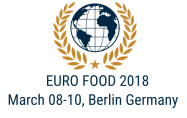
Kurt Richardson
Anitox, USA
Title: The effect of pre-enrichment media on the recovery and detection of Salmonella in feed
Biography
Biography: Kurt Richardson
Abstract
Current methodology for detecting Salmonella in feeds and feed ingredients are adapted from food safety methods. These methods do not take into account the stressed state of Salmonella in feed, presence of competing microorganisms nor the sample matrix. The objective was to evaluate four pre-enrichment media for the ability to maintain buffering capacity and the impact of acidic conditions on recovery. A wide variety of feed and ingredients were incubated in pre-enrichment media and pH determined at 24 hrs. It was observed that acidic conditions (pH 4.0-5.0) developed during pre-enrichment. Acidic conditions have been shown to impact the isolation and detection of salmonellae; however, the responses of more than 2,600 serotypes of Salmonella have not been evaluated. In a second study, cultures of four feed isolates (S. Montevideo, S. Senftenberg, S. Tennessee and S. Schwarzengrund) and four processing plant isolates (S. typhimurium, S. enteritidis, S. Infantis and S. Heidelberg) were grown on meat and bone meal before desiccation and heat exposure to induce stress similar to the feed production cycle. The survival of stressed isolates in acidic conditions (pH 4.0 to 7.0) was compared to non-stressed isolates. Cell injury was determined on xylose lysine tergitol 4 (XLT4) and death determined on nutrient agar (NA). Curve fitting techniques were utilized to determine the pH which resulted in 50% cell death or cell injury. Measured by cell death, S. typhimurium was the most acid tolerant and S. Heidelberg was the most acid sensitive in non-stressed Salmonella whereas S. Senftenberg was the most acid tolerant and S. Tennessee was the most acid sensitive in stressed Salmonella. The pH required to cause cell injury varied among isolates. The findings suggest that the pH of pre-enrichment media influences the recovery and biases the serotype recovered during pre-enrichment .

